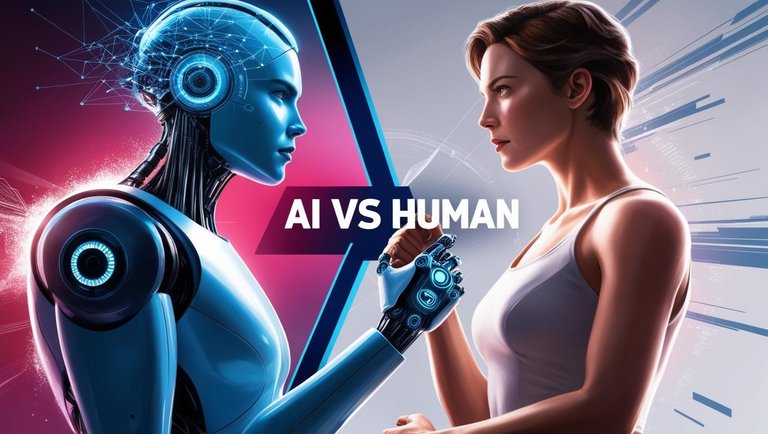Hey Everyone!!
Artificial Intelligence (AI) has rapidly become an integral part of our daily lives, influencing industries, businesses, and even personal interactions. From smart assistants to self-driving cars, AI is continuously evolving, performing tasks that were once solely dependent on human intelligence. While AI offers efficiency and convenience, it also raises concerns about job security, human creativity, and ethical implications. The question remains: Is AI truly better than humans, and will it ever reach a level where it completely replicates human intelligence?

Source: Canvas Dream Lab
One of the most significant concerns about AI is its impact on employment. AI-powered tools can perform complex tasks in a fraction of the time that humans take. Tasks that once required teams of professionals are now being completed by a single AI system, reducing the need for human intervention. Fields like customer service, IT, data analysis, and content creation have seen a shift where AI-driven automation is replacing traditional human roles. Artists, writers, and musicians also face challenges as AI-generated content becomes increasingly sophisticated, often overshadowing human-created work.
Despite AI’s efficiency, it still lacks the emotional depth, creativity, and ethical reasoning that define human intelligence. While AI can generate artwork, write articles, and compose music, it does so by analyzing existing patterns and data rather than through genuine inspiration. AI can predict outcomes based on vast amounts of information, but it cannot understand emotions, morality, or cultural significance the way a human can. This limitation makes AI an excellent tool for assistance rather than a true replacement for human intelligence.
The evolution of AI sparks debates on whether it will eventually become a complete replica of human intelligence. While AI can mimic conversations, recognize faces, and learn from experience, it still lacks the consciousness and self-awareness that define human beings. The concern is not only about AI replacing jobs but also about how it might alter human interactions, ethical values, and societal norms. If AI reaches a point where it can fully replicate human thoughts and emotions, it raises the question of whether AI should have rights or even decision-making power.
The potential dangers of AI cannot be overlooked. While AI is designed to make life easier, its misuse can lead to ethical dilemmas, security risks, and dependency issues. Deepfake technology, AI-powered surveillance, and autonomous weapons demonstrate how AI can be manipulated for harmful purposes. If AI is not regulated and controlled responsibly, it could become a threat rather than an asset to humanity.
AI is undoubtedly a revolutionary advancement that is shaping the future. However, it is essential to recognize that AI should complement human intelligence rather than replace it. Humans bring emotions, ethics, and creativity—qualities that AI cannot truly replicate. While AI will continue to play a significant role in various sectors, the true challenge lies in maintaining a balance where AI enhances human potential rather than diminishing it. The future of AI is exciting yet uncertain, and its impact on humanity will largely depend on how it is developed, used, and controlled.

TᕼᗩᑎK YOᑌ😊
ꜰᴏʀ ᴛᴀᴋɪɴɢ ᴛʜᴇ ᴛɪᴍᴇ ᴛᴏ ʀᴇᴀᴅ ᴍʏ ʙʟᴏɢꜱ!
ʜᴀᴠᴇ ᴀ ᴡᴏɴᴅᴇʀꜰᴜʟ ᴅᴀʏ🌞

Discord Server.This post has been manually curated by @bhattg from Indiaunited community. Join us on our
Do you know that you can earn a passive income by delegating to @indiaunited. We share more than 100 % of the curation rewards with the delegators in the form of IUC tokens. HP delegators and IUC token holders also get upto 20% additional vote weight.
Here are some handy links for delegations: 100HP, 250HP, 500HP, 1000HP.
100% of the rewards from this comment goes to the curator for their manual curation efforts. Please encourage the curator @bhattg by upvoting this comment and support the community by voting the posts made by @indiaunited..
This post received an extra 12.75% vote for delegating HP / holding IUC tokens.